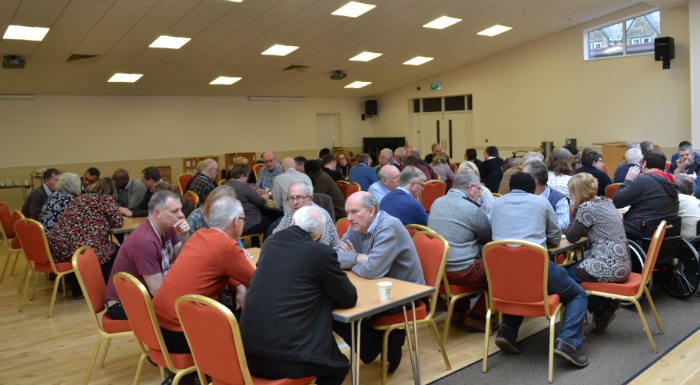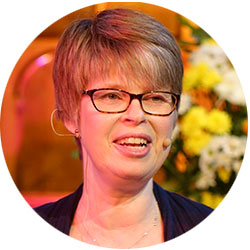Baptist Union Council: March 2016
Much of March 2016 Council was spent considering our Union’s response to The Marriage (Same Sex Couples) Act 2013, and specifically about churches wishing to register their buildings for the solemnisation of same sex marriage. Can we hold this tension in our Union? Could ‘a settled place’ be reached?
 ‘We come to listen and seek the mind of Christ together,’ said Stephen Keyworth, Faith and Society Team Leader (pictured), asking members to engage in ‘active listening.’
‘We come to listen and seek the mind of Christ together,’ said Stephen Keyworth, Faith and Society Team Leader (pictured), asking members to engage in ‘active listening.’
‘The way we aim to get to this place is as important as the place itself. It’s only by hearing each other that we will hear the mind of Christ.’
Council members were presented with all the emails from the talkingtogether@mail.com address, used to gather responses from individuals and churches as conversations around same sex relationships have taken place. This email address was first launched at Assembly 2013 and has been actively monitored since then. Conversations have occurred in many different places and contexts: Baptist Ministers’ Fellowship events, minister meetings, association gatherings, colleges, local church meetings and more.
Two representatives of churches which have wrestled with the issues were invited to share their church stories. One highlighted how the church had attempted to equip each individual in its congregation with resources to aid their deep biblical reflection, with articles, seminars, a series on grace and truth and a paper on hermeneutics.
There was a tension between working out how to lovingly respond to gay men and women, while theologically holding a traditional biblical understanding of marriage. There were missiological and ecclesiological factors too. Their journey as a church was continuing, the speaker said, their position described as ‘welcoming, loving, accepting – but not affirming (of same sex marriage).’
The second church had also engaged in a ‘deep and prayerful reading of scripture’ - and at a church meeting reached a decision to apply to register for same sex marriage. There had been pastoral fall out – a number of members had chosen to leave, and this had happened ‘largely, but not exclusively, on ethnic lines’. The church realises it could have spent more time with those who for cultural reasons found it difficult accept the decision. Many have remained in touch, however, and still help with a particular church outreach, while a deacon who doesn’t support the decision has remained committed to the church.
‘To our joy we have discovered in our covenantal relationship that what binds us is stronger than what divides us,’ the speaker said. ‘Our intent is not to harm the Union, which we love, but to be faithful to the scriptures.’
Council members were asked to reflect on the Declaration of Principle (DoP), initially forged in the 19th century, and subsequently adapted on occasions in the 20th. The DoP grew out of very ‘turbulent times’, but allowed two streams of Baptists (General and Particular) to come together as the basis of our Union.

‘It’s a way of describing who Baptists are, what we believe, and more importantly, who has authority… Christ is the absolute authority, as revealed in Scripture and discerned in the local church, through the power of the Holy Spirit.’ said Stephen Keyworth. ‘The question before us now is: if a church decides to register for same sex marriage, is that ok based on our Declaration of Principle?’
Encouraging Council members to engage in ‘covenant listening’, he continued, ‘It’s not unusual, and to be expected, that on this particular issue there is a wide range of views.
'As Baptists, we do need to take seriously the task of covenant listening – it’s vital to discerning theological authority. This is not just about local churches hearing what is said through the shared life of Associations, Council and Assembly. It is also about Council listening carefully to the voices that come from the churches as they engage in.
‘Throughout our history Baptists have always been in the process of disagreeing. Maybe it’s inevitable if you bring dissenters together(!) We shouldn’t avoid disagreement at all costs, but we must do it well if we are true to our calling.
‘I’m not saying it must be unity at all cost, as some have suggested – but disagreement must not become personal or adversarial. It’s about discerning the mind of Christ and we can only do that together.’
At various points through the gathering members broke off into small groups to discuss the issues raised. There was also extended feedback sessions, when the whole Council heard from each other.
There was gratitude for the two speakers, who had represented two churches that ‘took scripture seriously and took spiritual discernment seriously’. Their stories reiterated ‘our unity in diversity.’
One member spoke of his own personal journey, and how he ‘desperately wanted to come to a view that I could affirm it.’ The harsh reality is, ‘I can’t.’
While many noted their traditional views, (some spoke of representing churches that are ‘finding it difficult we are even discussing it’) a smaller number spoke of being in a different place. The pain and suffering of people from the LGBT community in our churches was highlighted on a number of occasions.
There was much concern as to why this particular issue should determine a breaking of the covenant in our Union. ‘All kind of differences exist among us,’ noted one member. ‘I’m puzzling that this one brings us to this place. Why this one? Why have we not had this discussion about churches that don’t affirm women?
‘What’s the next line in the sand?’
Another noted that the Declaration of Principle was ‘a gift’ from our predecessors that ‘allows us to live with difference.’
A statement was worked on in an attempt to reflect Council’s view. It was discussed at tables, with feedback offered, adapted and discussed again. Eventually a vote was taken, with a large majority agreeing to adopt the statement. Two members disagreed, alongside seven abstentions. One speaker highlighted how the minority 'will bear the cost' of its final paragraph.
 General Secretary Lynn Green (pictured) spoke of her sadness that complete consensus had not been reached. She spoke of her own grappling with this issue – her awareness of what she describes as a ‘profound Biblical truth’; alongside hearing from and being genuinely welcoming to those on the margins. ‘I’m caught between those two stories,’ she said.
General Secretary Lynn Green (pictured) spoke of her sadness that complete consensus had not been reached. She spoke of her own grappling with this issue – her awareness of what she describes as a ‘profound Biblical truth’; alongside hearing from and being genuinely welcoming to those on the margins. ‘I’m caught between those two stories,’ she said.
She commended Council members for their ‘mature listening,’ and her hope that the way members have discerned could be told alongside the statement that has arisen.
‘What’s been demonstrated here is that we’re listening to one another,’ she said. ‘It’s difficult, but it’s part of our tension.
‘It’s not perfect - but it’s where we are.’
At the end of the debate Council was informed that the statement would first be communicated directly to ministers and churches before it was made more widely available on the Baptists Together website.
Further comment:
Reflections on the Council of the BUGB's New Statement on Same Sex Marriage - Andy Goodliff (blog)
British Baptists and same-sex marriage: Can the denomination hold it together? - Mark Woods, Christian Today
Baptist Times, 21/03/2016